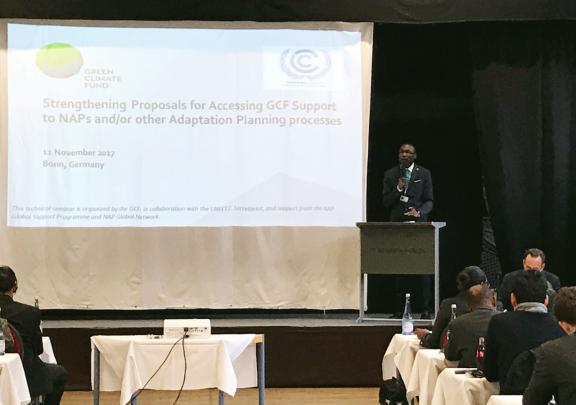Focus on adaptation planning at COP 23, surge in requests for GCF support
Uncertainty should not be a pretext for putting off preventative action, a leading UN figure in adaptation said during a seminar supported by GCF at the global climate change conference in Bonn.
Uncertainty should not be a pretext for putting off preventative action, a leading UN figure in adaptation said during a seminar supported by GCF at the global climate change conference in Bonn.
“Rather, the uncertainties of climate change should serve as an entry point for the use of risk sharing mechanisms and other similar contingency arrangements,” said Youssef Nassef, Adaptation Director at the Secretariat of the United Nations Framework Convention on Climate Change (UNFCCC).
“We are dealing with uncertainty all the time in our daily lives. Just look at the stock market, much of its transactions reflect a form of hedging against uncertainty.”
Mr Nassef said the development of accurate and precise data is necessary to quantify risk. This will then help to catalyse action and investment to address the wide range of climate change impacts by quantifying these uncertainties.
Science and data are also fundamental to identifying opportunities and designing action for societies to adapt to the reality of a changing climate, including the reduction of “surprise losses,” such as extreme weather.
Mr Nassef made these comments during the 23rd Conference of the United Nations Framework Convention on Climate Change (UNFCCC) at a technical seminar about strengthening the quality and impact of adaptation planning by developing countries with support of the Green Climate Fund (GCF).
The seminar attracted over 100 participants from more than 40 countries and 20 implementation support partners to focus on National Adaptation Plans (NAPs) and other adaptation planning processes.
It was designed to support countries and their delivery partners by providing an opportunity to share good practices for further improving the quality of proposals to access GCF funding for the formulation of adaptation planning processes.
This seminar was organised by the Green Climate Fund, in collaboration with the UNFCCC Secretariat, and support of the NAP Global Support Partnership and NAP Global Network.
Pa Ousman Jarju, Director of GCF’s Country Programming Division, said the Fund understands that countries urgently require financing to develop adaptation plans. He told participants how GCF is stepping up support to countries to help them strengthen the quality of proposals and access this funding.

In June this year, the GCF Board established a funding window within the Fund’s Readiness programme of up to USD 3 million for each country to help them develop their adaptation planning processes.
As of the end of October this year, 38 countries had submitted proposals for adaptation planning support, of which 10 are approved or endorsed.
“We are actively working to the best of our abilities with all countries that are seeking this support,” said Mr Jarju. “We want to ensure the use of adaptation planning funds from GCF is designed to catalyse maximum impact and investment in adaptation action on the ground.”
“The human suffering caused by climate change is intensifying hurricanes, wildfires, droughts, floods and threats to food security,” warned H.E. Frank Bainimarama, Prime Minister and President of COP 23 at the opening the annual climate change conference in Bonn. “There is no time to waste, and proactive adaptation planning is key to success,” he said.